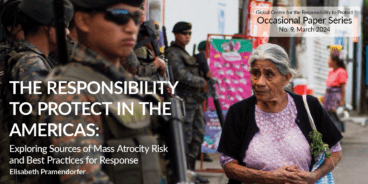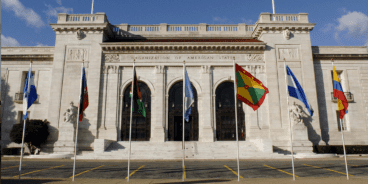
Meeting Summary: Regional Forum on Responsibility to Protect, Mexico City 2009
This regional forum for Latin America and the Caribbean was the first of its kind following the release of the January 2009 report of the UN Secretary-General (UN SG) on the Responsibility to Protect. Government representatives from capitals, embassies and missions to the United Nations were joined by NGOs and academics from the region. Participants welcomed the opportunity to exchange views in a regional context on the responsibility to protect and the Secretary-General‟s report. The discussion highlighted that the principles of the responsibility to protect signified a substantial development in human rights, touched on challenges to the acceptance and practice of R2P, and provided input into how a debate of the General Assembly should go forward.
Views on the UN Secretary General’s report and the upcoming debate
Many participants warmly welcomed the UN SG‟s report. The description of R2P as relating to “four crimes and three pillars” was widely accepted as an appropriate framework for defining the Responsibility to Protect. Many participants expressed that they had been concerned about the scope of R2P and felt assured by the Secretary-General‟s commitment to a „narrow‟ understanding of R2P limited to the four sets of crimes and violations of genocide, ethnic cleansing, crimes against humanity and war crimes. There was a shared sense of the need to take a positive approach toward the GA debate with the UN SG‟s report as a framework for discussion.
Some participants sought clarity about how to practically advance an agenda that focuses both on long-term capacity building and urgent responses. While the UN SG‟s report offers many ideas on both short-and longterm measures, the report is intended to begin the discussion and it was suggested that more analysis is needed to determine which measures are effective for preventing and halting mass atrocities.
Pillar 1: Responsibility of the State
As one participant observed, the undertaking contained in paragraph 138 of the World Summit Outcome Document of states to protect their people against genocide, war crimes, ethnic cleansing and crimes against humanity includes no qualifiers. These principles are absolute. There was consensus in support of the idea of sovereignty as responsibility.
Several participants noted a link between sovereignty as responsibility and the first pillar of R2P, and stressed that sovereignty does not offer a license to commit genocide. Several participants observed that pillar one is rooted in human rights norms, and these have been evolving and crystallizing in Latin America for many decades, not only in terms of adherence to international human rights norms and standards but also through the establishment of national human rights commissions and ombudsmen.
Pillar 2: Assistance of the State in Exercising Its Responsibility
Many participants expressed the importance of capacity building for those states that are, as one participant noted, „too weak to enforce law or exercise [their] power.‟ Some highlighted a particular challenge for Latin America: to address the marginalization of various ethnic groups through assistance and training.
Several participants expressed the view that more attention needed to be paid to the role of development assistance, and raised questions about how development should fit into the R2P agenda. They hoped that the debate of the General Assembly would provide an opportunity to consider which programs of assistance could reduce the likelihood that societies will be at risk of mass atrocities. Some participants raised concerns that “pillar II” assistance as described in the UN SG‟s report might be construed as conditionality of aid, which they would not support.
Pillar 3: Timely and Decisive Action
Speakers noted that responses to mass atrocities should not be limited to consideration of whether or not to use force. The World Summit Outcome Document is clear that when collective action is considered, it must be conducted according to the Charter; and not, for example, unilaterally. Enforcement action, authorized by the Council, must only come when peaceful means are inadequate and national authorities manifestly fail.
Several participants, mindful of the troubled history of intervention in Latin America, cautioned against placing too much emphasis on the military aspects of R2P during the UN General Assembly. However, participants were urged to raise the issue of sexual violence in the context of R2P, because it is being used as a method of perpetrating conflict.
Role of the General Assembly
The World Summit Outcome Document explicitly specified that the General Assembly continue consideration of the responsibility to protect, and several participants affirmed their support for a GA debate. Speakers asserted that the GA also has possible roles in developing an early warning/early alert system, exercising oversight of the Secretary-General‟s strategies, and elaborating on the types of state assistance and capacity building that will help a state to prevent mass atrocities. Moreover, as one of the two bodies that oversees the new Peacebuilding Commission, the GA also supports those countries emerging from conflict which have been susceptible to large-scale crimes against civilians. There is also a possible role for the General Assembly under a Uniting for Peace resolution if the Security Council fails to act to protect populations in a specific crisis situation.
Role of the Security Council
The World Summit Outcome Document also acknowledges a specific role for the Security Council in R2P – what the SG has called the “third pillar” of „timely and decisive action‟. Some participants questioned the role of the Security Council based on concerns about its double-standards and lack of transparency. There were questions about whether the Security Council can act preventively, and about the Council‟s willingness to address situations where populations are at risk of mass atrocities.
While these issues led participants to discuss ways the Council might be improved, including adopting principles on use of force and seeking agreement from the permanent members of the Security Council to refrain from using the veto, others expressed caution about linking R2P specifically with the Security Council reform agenda, because that issue is subject to its own negotiation process and would yield a debate too focused on the military aspects of R2P. And substantively, these discussions about process threaten to remove focus of the discussion away from the core issues of protection. As one participant warned, we cannot say that we won‟t stop genocide until the Council is reformed.
The Role of Civil Society
Civil society was recognized as having been an important constituency in supporting the development of responsibility to protect and ensuring that a General Assembly debate stays focused on the fundamental messages of R2P. It was recognized that responsibility to protect is not known throughout the region, and civil society can play an important role in education, raising awareness, broadening the debate and mobilizing world public opinion.
List of Attendees
Speakers
-
-
- Ambassador Juan Manuel Gomez-Robledo, Vice Minister of Mexico for Multilateral Affairs and Human Rights
- Edward C. Luck, Special Advisor to the UN Secretary-General, Vice President of International Peace Institute
- Francis Deng, Special Advisor to the Secretary General on the Prevention of Genocide
- Heraldo Muñoz, Permanent Representative of the Mission of Chile to the United Nations
- Anwar Choudhury, Director of International Institutions, Foreign and Commonwealth Office of the United Kingdom
- Monica Serrano, Global Centre for the Responsibility to Protect
- Nicole Deller, Global Centre for the Responsibility to Protect
-
Participants
Representatives from the Governments of: Argentina, Belize, Bolivia, Brazil, Chile, Costa Rica, Cuba, Dominican Republic, Ecuador, El Salvador, Granada, Guatemala, Honduras, Jamaica, Mexico, Panama, Paraguay, Peru, Nicaragua, St. Kitts and Nevis, St. Lucia, St. Vincent and Grenadines, Trinidad and Tobago, Venezuela.
Representatives of academia and civil society from: CIDE, El Colegio de México, Fundaciόn Ungo, Ford Foundation, Fundación por la Libertad de Expresión, IEPADES, ITAM, Justicia Viva, Security Council Report, Stanley Foundation, Universidad Diego Portales, Universidad di Tella, United Nations University
Related Content


La Responsabilidad de Proteger et la Organización de Estados Americanos
